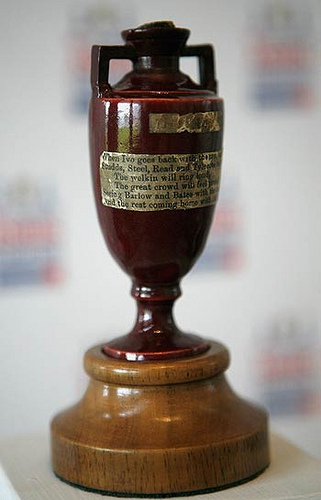
The Australian journalist Gideon Haigh is probably the best living cricket writer, certainly in English, and during 2005 we had the luxury in England of having him write a column in The Guardian – later edited, quickly, into one of the best books on that epic series.
Sadly, the advertising downturn means that there’s not a repeat performance for this year’s series. Happily, though, the internet means that we can still access his coverage is Australia’s Business Spectator (and if that seems strange, it’s worth noting that Haigh also wrote, pre-crash, one of the best books on the dizzying corporate greed of the last 20 years).
Here’s a couple of good moments from his coverage so fa, three days into the first Test of the five-match series:
From his preview (which also includes a characteristic flourish about Churchill and the Dardanelles):
The five-test series was for a century the standard unit of international cricket rivalry. Now it is only played by the format’s pioneers over the course of Ashes. Late last year, England played West Indies in a Twenty20 match that lasted less than three hours for a grubstake of $US20 million. For England to now spend seven weeks playing Australia mainly for honour and glory seems almost unpardonably decadent.
On Pietersen’s dismissal by the Australian spinner Hauritz in England’s first innings:
The beneficiary of Pietersen’s largesse was a deserving one: Nathan Hauritz, said so often not to be Shane Warne that he must sometimes feel like issuing a pre-emptive public apology. Hauritz would have been an onlooker had Brett Lee maintained fitness, and still seems to lack the variation necessary to prosper at the top level. But the delivery in question could hardly have been improved on, drifting away toward slip and dragging Pietersen so wide that he almost ended up on the neighbouring pitch.
And on Hughes’ dismissal by Flintoff in Australia’s first innings:
Taller, stronger, Flintoff’s first over to Hughes almost justified his selection on its own, five deliveries from round the wicket bouncing sternum-high, a sixth veering past the outside edge, bowler following through down the pitch with his jolly jacktar’s swagger. The ball hit Prior’s gloves with a satisfying whack rather than the clang that sometimes emanates from them. Hughes was in Year 10 when Flintoff made the Ashes of 2005 his own: this must have been like living out a still-fresh schoolboy fantasy.
More daily at the Business Spectator.
I have just watched Empire of Cricket on the TV and have to contest a a statement made by Gideon Haigh. He maintains that Australian society in unlike that of the UK in so far as there is no social hierarchy or class distinction in Australia and that is a fundamental difference which some how has a bearing as to how Australians approach the game of cricket.
Well Mr Haigh I don’t know at what level of society you exist in in Australia but I believe you are so wide of the mark its unreal.
I have been to Australia many times on business and quite frankly the attitude of the European Australian, to the indigenous Australian is a national disgrace.
I don’t mix with the privileged Australians, the cricketer, the tennis player, the journalist, the politician, I meet average Joe, Tom, Jack, Bill, and believe me in my experience they are the amongst the most prejudiced and hierarchical people I have met any where in the world, including the USA.
That doesn’t mean they are not nice people–just narrow minded and prejudiced about the structure of Australian society—I have to bite my tongue on many occasions when comments are made.
For you to come on UK TV and pump a propaganda line like Australia is some enlightened society, that is just so arrogant and proves to me that Australia does not consider the native Australian in any calculation concerning the country.
Social hierarchy, social prejudice, Australia in my experience is in the dark age, shame-full. You should not be proud of yourself for that statement Mr Haigh.